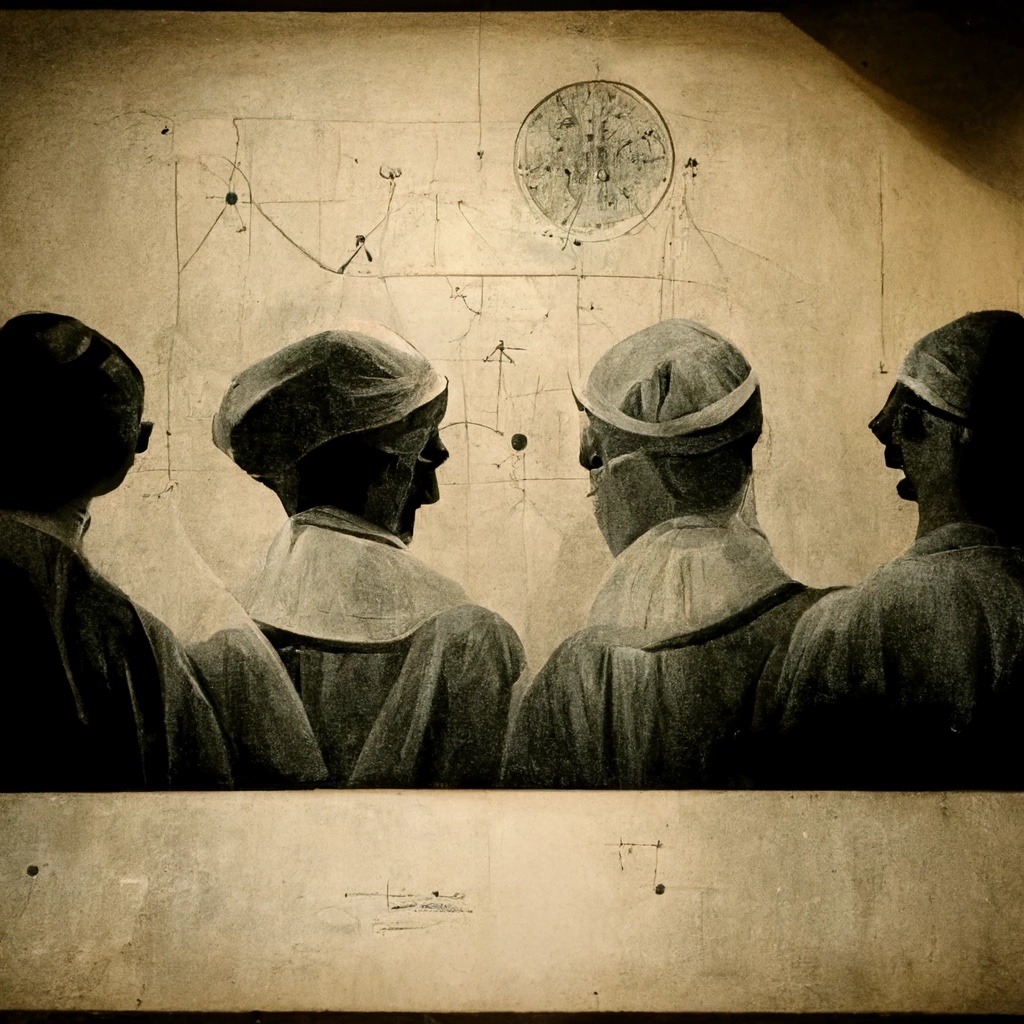UNPROFESSIONAL (4)
By:
April 12, 2024

First published in The Story-Teller Magazine for October 1930 and collected in Limits and Renewals (1932), Kipling’s final proto-sf story explores the notion that mysterious processes at work in human tissues might be related to “waves” from the universe — and that in order to understand them, imagination and intuition may be as important as scientific investigation. HiLoBooks is pleased to serialize this story for HILOBROW’s readers.
UNPROFESSIONAL: 1 | 2 | 3 | 4 | 5 | 6 | 7 | 8.
Vaughan — the professional man — merely wanted to telephone for a taxi that he might drive to discredit a hated West End rival by calling him to his bedroom window and there discussing ‘dichotomy’ — a hard word at 3 A.M.
Then they packed Loftie off for a month’s holiday, with a cubic metre of seven-and-sixpenny detective novels, plus Vaughan’s aunt to see that he ate and dressed properly. On his return, he began certain experiments with mice, which Frost took charge of in the boiler-room, because he remembered when their ancestors served in the earliest submarines. It seemed that ‘tides’ worked in their tissues also; but slipped a little round the clock according to the season of each litter’s birth.
And there were born to them mice among mice with prodigious ‘tides.’ Some of these, inoculated at the flood, threw off the trouble, and were promoted by Frost to the rating of pets. Treated on their lowest ebbs, they perished less quickly than the average. Harries kept careful count of their times in all things and ways, and had Frost sling some of their cages on various compass-bearings or set them out in moonlight or thunderstorms.
This last was too much for Loftie, who returned once more to the legitimate drama of cultures and radium emanations, and the mysteries of malignant cells which never acknowledge any ‘tide.’ At the end of three weeks, he, and Frost, broke off the campaign.
He said to Harries one evening after watching their usual film: ‘What do you suppose germs think of?’
‘If you’ve got as far as that,’ was the answer, ‘you’ll develop an imagination one day.’
Then Vaughan came in full of trouble. His matron had been immobilised by sciatica, and his household staff had taken base advantages. He needed at once, some table-napkins, some bathtowels, two jacketed water jugs and a metal — not china — bedroom breakfast-set. Ackerman said he would speak to Frost and see what could be spared from the ship.
While they were laughing at Vaughan, St. Peggotty’s rang him up. He replied: ‘Well, well! If it was coming, it was to be expected now…. One of my beds empty? … You can have it…. Send her over to me…. You must! . . I’ll warn my people to expect her? … Oh? That’s all right…. I’ll send the car…. Yes, and all other expenses…. Because I operated on her originally, of course. We’ll expect her at nine, then…. Righto! … Not in the least. Thank you, old man.’
He then telephoned his home to prepare for a patient, and returned to the still circle by the fire.
‘It’s one of those twin cases of mine,’ he explained. ‘One of ’em’s back again. Recurrence — in the scar — after eighteen months.’
‘That means?’ said Harries.
‘With that particular kind of trouble — three — five months’ reprieve — perhaps. Then final recurrence. The other one’s all right, so far, they say.’
‘She would be. This one is One-twenty-Eight,’ said Loftie.
‘How do you make that out?’
Frost had entered and was going through Vaughan’s indent with Ackerman.
‘Frost, what is One-twenty-Eight’s timing?’ Loftie interposed.
‘One-two-Eight, sir? Flood from midnight till four a.m. — ebb from four to eight p.m… Yes, sir, I can make the table-linen all right, and the jugs. But we’re short on bath-towels just now.’
‘Would it prove anything if she lasted out nine months?’ Harries picked up the thread of talk with Vaughan.
‘No. There are rallies and reserves.’
‘A full year?’
‘I should accept that. But I know who wouldn’t.’ Vaughan gave a great name.
‘Thanks for reminding me,’ said Ackerman over his shoulder. ‘Frost, the bathroom hotwater pipe has got arterial sclerosis, too. Operate on it.’
‘When shall you operate, Taffy?’ Harries held on.
‘To-morrow at a quarter to ten. I always feel fittest then.’
‘Think of the patient for a change. Suppose you stand-to at a few minutes to midnight tomorrow? I’ll telephone you zero from here.’
Vaughan seemed a shade taken aback. ‘Midnight? Oh, certainly,’ he said. ‘But I’ll have to warn my anaesthetist.’
‘And Ferrers ’ll swear you’ve taken to drink or drugs,’ said Ackerman. ‘Besides, think of your poor matron and the nurse who’s got to have her evening off? Much better let the woman conk out in Trades Union hours, Taffy.’
‘Dry up, padrone,’ said Loftie. ‘No need to bring in Ferrers. I’ll take his place — if you think I’m safe.’
Since this was as if Raeburn had volunteered to prime a canvas for Benjamin West, Vaughan accepted, and they sat down to eat.
RADIUM AGE PROTO-SF: “Radium Age” is Josh Glenn’s name for the nascent sf genre’s c. 1900–1935 era, a period which saw the discovery of radioactivity, i.e., the revelation that matter itself is constantly in movement — a fitting metaphor for the first decades of the 20th century, during which old scientific, religious, political, and social certainties were shattered. More info here.
SERIALIZED BY HILOBOOKS: Jack London’s The Scarlet Plague | Rudyard Kipling’s With the Night Mail (and “As Easy as A.B.C.”) | Arthur Conan Doyle’s The Poison Belt | H. Rider Haggard’s When the World Shook | Edward Shanks’ The People of the Ruins | William Hope Hodgson’s The Night Land | J.D. Beresford’s Goslings | E.V. Odle’s The Clockwork Man | Cicely Hamilton’s Theodore Savage | Muriel Jaeger’s The Man With Six Senses | & many others.
